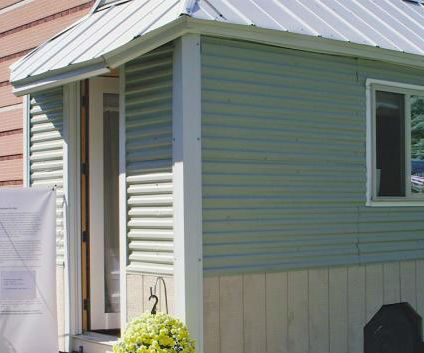In order to deal with stress, Rev. Rebecca Rutter began building a tiny house. She found that by eliminating some excess from her life, she experienced emotional and spiritual enrichment.
Note: the following are excerpts taken from a UMC.org article written by Joe Iovino. You can view the entire article here. A podcast interview with Rev. Rutter is also available here.
 It was a stressful year for the Rev. Rebecca Rutter. The United Methodist pastor was finishing seminary, pastoring a church, and parenting three children. She needed something to help her relax. So she did what any of us would do. She built a tiny house.
It was a stressful year for the Rev. Rebecca Rutter. The United Methodist pastor was finishing seminary, pastoring a church, and parenting three children. She needed something to help her relax. So she did what any of us would do. She built a tiny house.
"I decided I'm just going to need a way of consistently having time just for myself," she remembers, "to get away, to go out to the backyard and work on this."
Rutter developed an interest in designing houses at an early age. As a child, she dreamed up mansions, the fantasies of a youngster.
"As I got a little older," she continues, "I started realizing that we all have limits in life, and actually limits are a good thing." That's when she started challenging herself.
"Let's see if I can design an 800 square foot house that still has a comfortable space for everything," she recalls thinking while in junior high school. Designing everything to fit into the tiny house's 98 square feet was a greater challenge yet.
"Whenever you design or build something," Rutter explains, "you have to think, what's the priority here? Do I want more space to have people sit down and sit around a table? Do I want more space in a kitchen? Do I want more space here or there? It really forces you to look closely at priorities, not just for that project, but in life."
 Rutter's work on the tiny house caused her to consider priorities in other areas of life.
Rutter's work on the tiny house caused her to consider priorities in other areas of life.
"I'm learning how…to recognize what I really need to thrive and to be available to what God is calling me to do and prioritize in life."
Rutter explains that living more simply begins not with focusing on what we will do without, but by being grateful for what we have. Gratitude not only changes our hearts, it also helps us become better stewards of our natural resources.
Building on a budget and wanting to minimize waste, Rutter often made use of leftover material from other projects.
"For instance, all of my metal framing for the house came from somebody's basement that they had left over from a project," she reports. "Another thing is all the siding and the roofing that I have on my house were found in my parents' barn from a leftover project." All of those materials would have probably ended up in a landfill had she not rescued them for her tiny house.
|
"We think that our lives will be happier and more fulfilled if we have more… whatever it is." |
"I think consumption is one of the key problems in what we are doing in our earth," Rutter explains. "We think that our lives will be happier and more fulfilled if we have more… whatever it is."
"Our sufficiency, and our joy, and our contentment are found only in Christ," she continues, "and that takes spending time with God by diving deep into the riches of his Word, in fellowship with other believers, and finding true joy and contentment in loving God and our neighbor. As we do that, all the other things of this world fade in their importance and we're not as tempted to consume and be materialistic."





